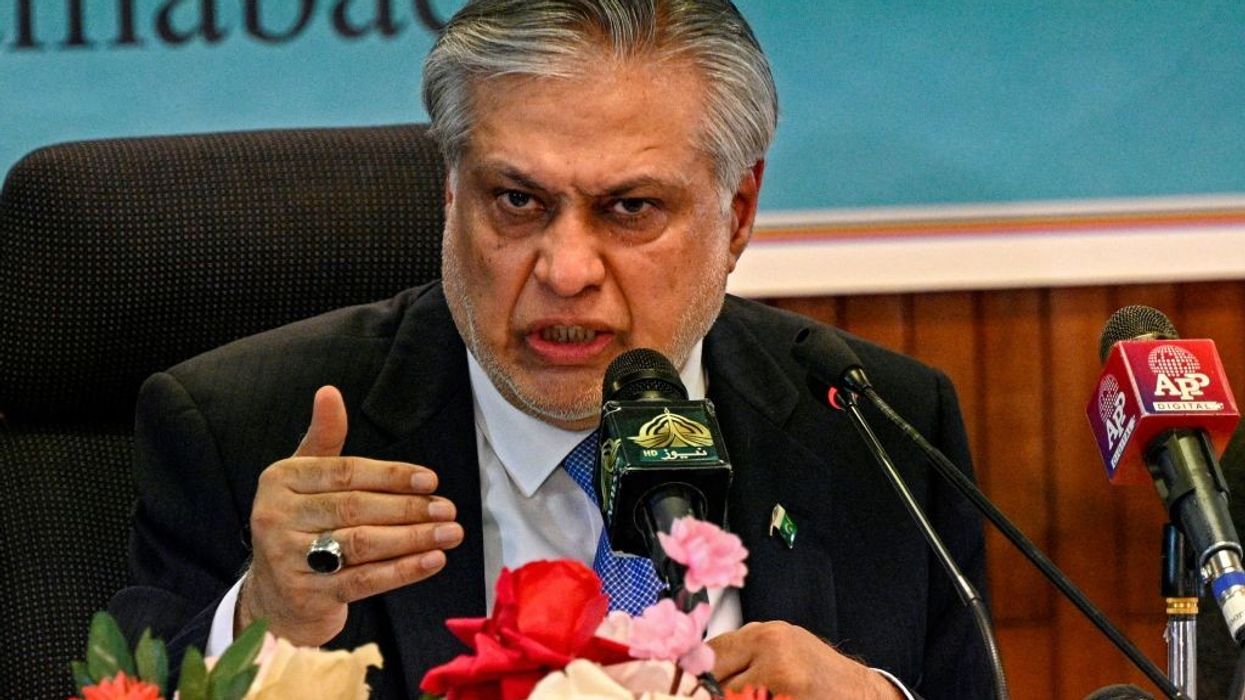PAKISTAN'S cash-strapped government unveiled a Rs 14.5 trillion (£40 billion) budget on Friday (9), with more than half set aside to service Rs 7.3 trillion (£20 bn) of debt.
Pakistan's economy has been stricken by a balance-of-payments crisis as it attempts to service crippling external debt, while months of political chaos have scared off potential foreign investment.
Inflation has rocketed, the rupee has plummeted and the country can no longer afford imports, causing a severe decline in industrial output.
About Rs 950 bn (£2.63 bn) was earmarked for vote-winning development projects ahead of a general election later this year, while other populist measures include civil service pay rises of up to 35 per cent, and a 17.5 per cent increase for state pensions.
Presenting the budget to the National Assembly on Friday, Finance Minister Ishaq Dar insisted targets had been prudent.
"There are general elections in the country soon, but despite that the next fiscal-year budget is prepared as a responsible budget instead of an election budget," he said.
Prime Minister Shehbaz Sharif blamed his predecessor Imran Khan - ousted by a vote of no-confidence in April last year - for the morass.
"Our preceding government has battered the economy," he said.
Poor being 'humiliated'
Akhtar Khan Nawaz, a labourer at a fruit and vegetable market in the capital Islamabad, said "the poor were being humiliated".
"(The budget) will be of no use unless inflation is reduced, the poor will only get relief if inflation is eased," he said.
Sharif said he was optimistic for an extension later this month on an International Monetary Fund (IMF) loan facility crucial to keeping the economy afloat.
"The IMF chief has given his verbal commitment... there is no hindrance," he said.
The IMF has told Pakistan it needs to secure additional external financing, scrap a swathe of populist subsidies, and allow the rupee to float freely against the dollar before unlocking another tranche of the $6.5 bn (£5.17 bn) facility.
Still, the latest budget sets aside Rs 1.07 trillion (£3 bn) for subsidies.
"The government definitely has to take such popular decisions as it is the election year," said Nasir Iqbal, an economist at the Pakistan Institute of Development Economics (PIDE).
The country failed to meet any economic growth targets for the fiscal year 2022-23, according to a key government report released on Thursday (8), with GDP growth a miserly 0.3 per cent.
Dar said on Friday the latest budget was based on GDP growth of 3.5 per cent, although the World Bank projected a less-ambitious two percent growth in a report issued earlier this week.
It also had an annual inflation forecast of 21 per cent, against a current year-on-year rate of 37.97 per cent.
The economy has also been ravaged by record monsoon floods last year that left almost a third of the country underwater, laying waste to vast swathes of farmland and leaving tens of millions homeless.
But the political crisis remains the biggest risk factor in the months ahead.
Former premier Khan's hugely popular campaign to return to office spilled into street violence after his brief arrest last month, prompting a massive crackdown on his party including mass arrests and trials scheduled for military courts.
The army holds undue influence over Pakistan politics, having staged at least three successful coups leading to decades of martial law.
Attacks by militants have also risen since the Taliban took control in neighbouring Afghanistan, further undermining the prospect of foreign investment.
On Friday Dar earmarked Rs 1.8 trillion (£5 bn) for defence spending - up from last year's Rs 1.5 trillion (£4.2 bn).
(AFP)
Pakistan unveils £40 billion budget, with half to service debt
Finance Minister Ishaq Dar says budget is based on GDP growth of 3.5 per cent and targets are prudent




